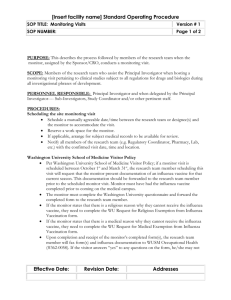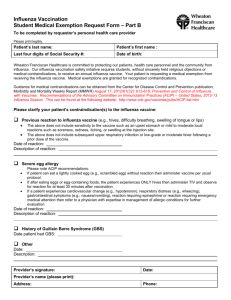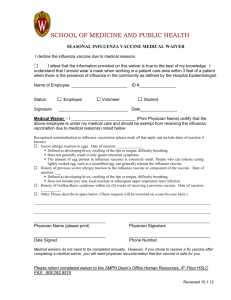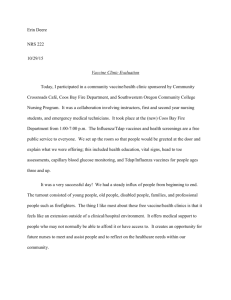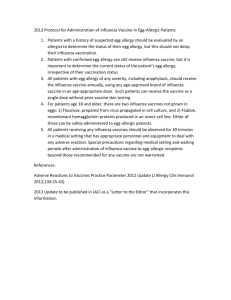Coverage update, Intussusception, Influenza
advertisement
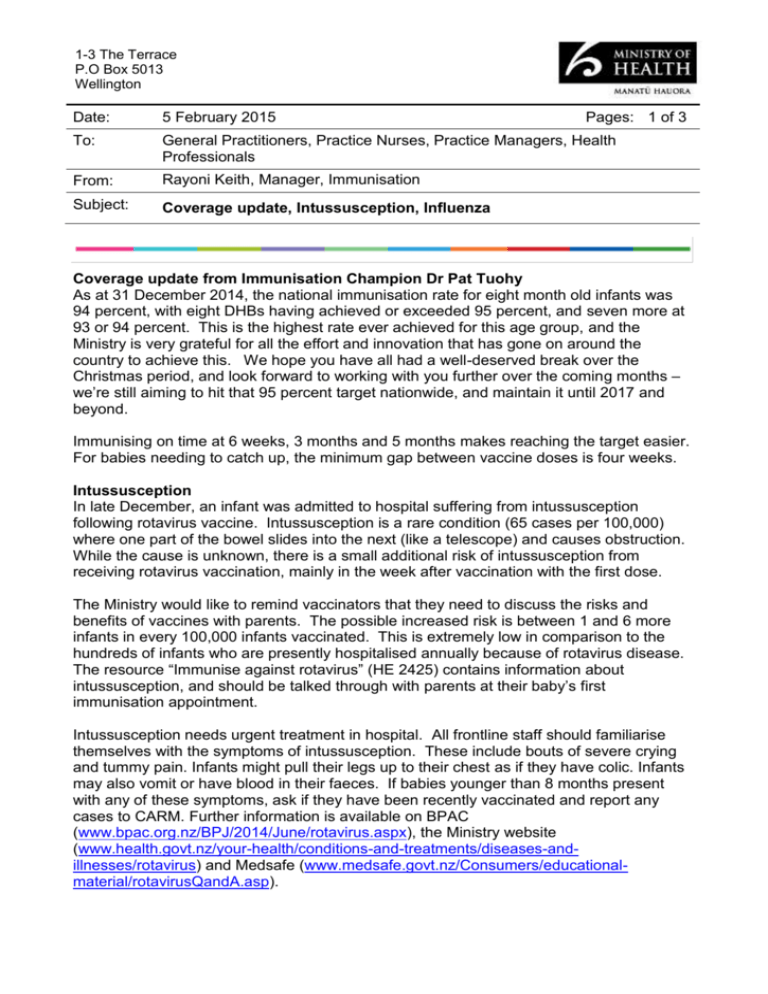
1-3 The Terrace P.O Box 5013 Wellington Date: 5 February 2015 Pages: 1 of 3 To: General Practitioners, Practice Nurses, Practice Managers, Health Professionals From: Rayoni Keith, Manager, Immunisation Subject: Coverage update, Intussusception, Influenza Coverage update from Immunisation Champion Dr Pat Tuohy As at 31 December 2014, the national immunisation rate for eight month old infants was 94 percent, with eight DHBs having achieved or exceeded 95 percent, and seven more at 93 or 94 percent. This is the highest rate ever achieved for this age group, and the Ministry is very grateful for all the effort and innovation that has gone on around the country to achieve this. We hope you have all had a well-deserved break over the Christmas period, and look forward to working with you further over the coming months – we’re still aiming to hit that 95 percent target nationwide, and maintain it until 2017 and beyond. Immunising on time at 6 weeks, 3 months and 5 months makes reaching the target easier. For babies needing to catch up, the minimum gap between vaccine doses is four weeks. Intussusception In late December, an infant was admitted to hospital suffering from intussusception following rotavirus vaccine. Intussusception is a rare condition (65 cases per 100,000) where one part of the bowel slides into the next (like a telescope) and causes obstruction. While the cause is unknown, there is a small additional risk of intussusception from receiving rotavirus vaccination, mainly in the week after vaccination with the first dose. The Ministry would like to remind vaccinators that they need to discuss the risks and benefits of vaccines with parents. The possible increased risk is between 1 and 6 more infants in every 100,000 infants vaccinated. This is extremely low in comparison to the hundreds of infants who are presently hospitalised annually because of rotavirus disease. The resource “Immunise against rotavirus” (HE 2425) contains information about intussusception, and should be talked through with parents at their baby’s first immunisation appointment. Intussusception needs urgent treatment in hospital. All frontline staff should familiarise themselves with the symptoms of intussusception. These include bouts of severe crying and tummy pain. Infants might pull their legs up to their chest as if they have colic. Infants may also vomit or have blood in their faeces. If babies younger than 8 months present with any of these symptoms, ask if they have been recently vaccinated and report any cases to CARM. Further information is available on BPAC (www.bpac.org.nz/BPJ/2014/June/rotavirus.aspx), the Ministry website (www.health.govt.nz/your-health/conditions-and-treatments/diseases-andillnesses/rotavirus) and Medsafe (www.medsafe.govt.nz/Consumers/educationalmaterial/rotavirusQandA.asp). Influenza Preparations are under way for the 2015 influenza season. This year, the vaccine will include two new strains, A/Switzerland/9715293/2013 (H3N2)-like virus, and B/Phuket/3073/2013-like virus. The Switzerland strain is the strain currently predominating in the Northern Hemisphere. The 2015 Influenza Kit is now being posted to practices, and is available for download from www.influenza.org.nz/resources. A pre-order form for the vaccines is attached as page 3 of this update. Because the vaccine strains are new, the vaccine will be later than usual arriving into the country. At this stage we expect continuous supply in early to mid-April – please wait until the date is confirmed before booking clinics. Eligibility INFLUVAC® and FLUARIX® are the two funded vaccines for 2015, for all eligible patients. The Ministry has been informed that an unfunded vaccine, FLUVAX®, will be available earlier than the funded vaccines, as it has used a strain (A/South Australia/55/2014) that is antigenically similar to A/Switzerland. The A/South Australia vaccine strain is expected to protect against the A/Switzerland strain and vice versa. The Ministry of Health recommends that FLUVAX® should only be given to individuals aged 9 years and over, and it must not be used in children under age 5 because of the risk of febrile convulsion. Recording Influenza on the NIR As in 2014, the Ministry expects influenza vaccinations given at general practices to be recorded on the NIR. To record an adult’s influenza vaccine information on the NIR select the opt-on button on your PMS. For adults not wanting their influenza vaccine information recorded on the NIR please leave the opt-on/off fields blank. The immunisation information will only be recorded on your PMS and will not be sent to the NIR. To help avoid errors in recording influenza on the NIR: • Ensure you have the most up to date PMS software version. • Send a list of all the vaccinators and GPs who will deliver the influenza vaccine in your practice to your local DHB NIR administrator before the beginning of the influenza season to ensure they are entered into the system. • Vaccinators should validate patients’ addresses in all address fields before they are messaged to the NIR. • The provider should be noted as the “GP” and the nurse the “vaccinator”. Pharmacy and Occupational Health The Ministry is working towards vaccinating pharmacists being able to send influenza vaccine messages to the NIR. This is likely to happen mid to late 2015. At this stage influenza vaccines given in occupational health settings will not be sent to the NIR as these providers are not currently electronically linked to the NIR. It is expected in the future that all influenza vaccine providers will send information to the NIR. All Pharmacists and Occupational Health providers are expected to notify an individual’s general practice when they have administered an influenza vaccine to one of their patients so the individual’s medical records can be updated. If you have any queries about anything in this update, please email immunisation@moh.govt.nz
